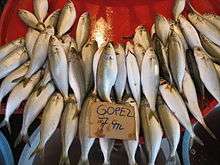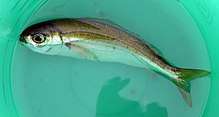Boops boops
Boops boops /ˈboʊ.ɒps/; Greek: βόωψ boōps, literally "cow-eye"), commonly called a bogue, is a species of seabream native to the eastern Atlantic.[2] Its common name in most languages refers to its large ("bug") eyes. It is found off the coasts of Europe, Africa, the Azores and the Canary Islands, from Norway to Angola, and in the Mediterranean and Black Seas. The species avoids brackish waters such as the Baltic Sea. A demersal and semi-pelagic feeder, it can generally be found down to 100 m, and infrequently down to 350 m. It consumes seaweed, crustaceans, and some plankton, in schools that rise to the surface at night. Individuals can reach 36 cm, but average 20 cm.

| Boops boops | |
|---|---|
 | |
| Boops boops in a bucket. | |
| Scientific classification | |
| Kingdom: | Animalia |
| Phylum: | Chordata |
| Class: | Actinopterygii |
| Order: | Perciformes |
| Family: | Sparidae |
| Genus: | Boops |
| Species: | B. boops |
| Binomial name | |
| Boops boops | |
| Synonyms | |
| |
Sex determination in the bogue is unclear. It has variously been described as a rudimentary intersex organism, with a few intersex individuals, or a protogynic intersex, with individuals starting out life as females, and some becoming male later on.
The species is commercially fished, with 37,830 tonnes taken in 2008.[2] It is marketed in sizes from Small (1/2, 2/3), Medium (2/4, 3/5, 4/6), Large (4/8, 4/7, 5/7, 5/8). Sizes are not standardized, but the mentioned sizes are often used in commercial transactions. When cleaned and pan fried, broiled or baked fresh, they are good tasting, but when stored their gut flora soon spread unpleasant flavors to their flesh.[3] Much of the catch is used for fishmeal or tuna fishing bait.
Parasites
The bogue is host to a wide variety of parasites, ranging from metazoans such as monogenean flatworms (e.g. Microcotyle isyebi),[4] acanthocephalan spiny-headed worms, nematode roundworms, isopod and copepod crustaceans and myxozoan cnidarians to the unicellular dinoflagellate Ichthyodinium chabelardi, a parasite lethal to eggs developing in ovaries. At least 67 metazoan parasite species have been reported from the species.[5] In the aftermath of the 2002 Prestige oil spill, the community of parasitic species inhabiting bogue caught off the coast of Spain was noticeably altered.[6]
References
- NatureServe (2013). "Boops boops". IUCN Red List of Threatened Species. 2013. Retrieved 15 December 2014.CS1 maint: ref=harv (link)
- "Boops boops". Fisheries Global Information System. Food and Agriculture Organization of the United Nations. Retrieved 16 January 2011.
- Koutsoumanis, K.; Nychas, G. J. (1999). "Chemical and sensory changes associated with microbial flora of Mediterranean Boque (Boops boops) stored aerobically at 0, 3, 7, and 10°C". Applied and Environmental Microbiology. American Society for Microbiology. 65 (2): 698–706. PMC 91082. PMID 9925603.
- Bouguerche, Chahinez; Gey, Delphine; Justine, Jean-Lou; Tazerouti, Fadila (2019). "Towards the resolution of the Microcotyle erythrini species complex: description of Microcotyle isyebi n. sp. (Monogenea, Microcotylidae) from Boops boops (Teleostei, Sparidae) off the Algerian coast". Parasitology Research. doi:10.1007/s00436-019-06293-y. ISSN 0932-0113.
- Olmo, Ana Pérez-del; Fernández, Mercedes; Gibson, David I.; Raga, Juan Antonio; Kostadinova, Aneta (2007). "Descriptions of some unusual digeneans from Boops boops L. (Sparidae) and a complete checklist of its metazoan parasites". Systematic Parasitology. Springer. 66 (2): 137–157. doi:10.1007/s11230-006-9063-5. PMID 17318367.
- Pérez-del Olmo, A.; Raga, J.A.; Kostadinova, A.; Fernández, M. (2007). "Parasite communities in Boops boops (L.) (Sparidae) after the Prestige oil-spill: Detectable alterations". Marine Pollution Bulletin. Elsevier. 54 (3): 266–276. doi:10.1016/j.marpolbul.2006.10.003. PMID 17118407.
External links
- Photos of Boops boops on Sealife Collection
| Wikimedia Commons has media related to Boops boops. |
